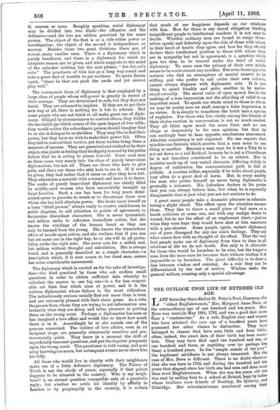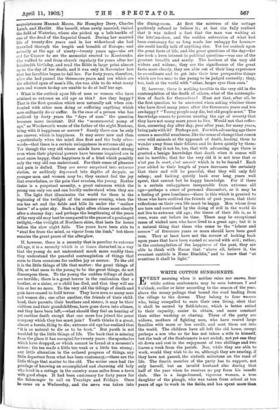THE OUTLOOK UPON LIFE OF EXTREME OLD AGE.
T4AST Saturday there died at St. Peter's Port, Guernsey, the "oldest Englishwoman," Mrs. Margaret Anne Neve, at the extraordinary age of one hundred and ten years. Mrs. Neve was born,on May 18th, 1792, and was a good deal more hen a "centenarian." As a rule, English men and women who have attained the rare age of a hundred years have possessed few other claims to distinction. They have belonged to classes that have seen little and done little; often, indeed, the exact date of their birth has been uncer- tain. They may have died aged one hundred and one, or one hundred and three, or anything over (or perhaps less than) a hundred years. In the "simple annals of the poor" the baptismal certificate is not always treasured. But the case of Mrs. Neve is different. There is no doubt whatever that she was born in 1792, and during the hundred and tee years that elapsed since her birth she had seen and done more than most Englishwomen. When she was ten years old she Was sent by sailing boat to a school at Bristol, kept by ladies whose brothers were friends of Southey, De Quince)', and Coleridge. Her schoolmistresses numbered among their gequaintanoes Hannah Moore, Sir Humphry Davy, Charles Lamb, and Razlitt. She herself, when newly married, visited the field of Waterloo, where she picked up a belt-buckle of cue, of the dead of the Imperial Guard. During her married life of twenty-five years and in her widowhood she had travelled through the length and breadth of Europe; and actually at the age of ninety—twenty years ago—she set pet for Cracow to see the memorial erected to Kosciuszko. She walked to and from church regularly for years after her hundredth birthday, and read the Bible in large print almost up to the day of her death, and it was only in November last that her faculties began to fail her. For forty years, therefore, after she had passed the threescore years and ten which are the allotted span of man's life, she was able to do what many men and women to-day are unable to do at half her age.
t What is the outlook upon life of men or women who have attained so extreme an old age as this ? Are they happy ? That is the first question which men naturally ask when con- fronted with other men doing or suffering anything which men ordinarily do or suffer. In the case of a person who has outlived by forty years the "days of man" the question becomes more insistent. Did the "monumental pomp of age," as Wordsworth wrote of the father of the eight Nortons, bring with it happiness or sorrow Surely there can be only one answer, which is happiness. It may occur now and then —particularly when the mind dies first and the body after- wards—that there is a certain unhappiness in extreme old age. Yet though the very old whose minds have remained strong even when their physical powers have become impaired are in most cases happy, their happiness is of a kind which possibly only the very old can understand. For their sense of pleasure and pain is dulled. They are never surprised into extreme elation, or suddenly depressed into depths of despair, as younger men and women may be; they cannot feel the joy that overwhelms, or the pain that crushes, the young. Rather theirs is a perpetual serenity, a great calmness which the young can only see and can hardly understand when they see it. The light that illuminates the world for them is the beginning of the twilight of the summer evening, when the sun has set and the fields and hills lie under the "mellow lustre" of a quiet sky. Such a light often shines most clearly after a stormy day; and perhaps the lengthening of the years ef the very old may best be compared to the peace of a prolonged twilight,—the twilight of Northern skies, that lasts for hours before the slow night falls. The years have been able to steal fire from the mind, as vigour from the limb," but there remains the great peace of the afterglow.
• If, however, there is a serenity that is peculiar to extreme old age, it is a serenity which is at times disturbed in a way that the young do not understand much more readily than they understand the peaceful contemplation of things that seem to them occasions for sudden joy or sorrow. To the old it is the little things of life that matter: the great things of life, or what seem to the young to be the great things, do not discompose them. To the young theY sudden tidings of death are terrible; there is a great horror in the realisation that a brother, or a sister, or a child has died, and that they will see him or her no more. To the very old the tidings of death and pain have ceased to hold terror. They have seen so many men and women die; one after another, the friends of their child- hood, their parents, their brothers and sisters, it may be their children and their grandchildren, have gone down into silence, and they have been left,—what should they feel on hearing of yet another death except that one more has joined the great company which they too must join Youth thinks it a great, almost a heroic, thing to die; extreme old age has realised that "it is as natural to die as to be bcrn." But youth is not troubled by the little things of life. The book that is missing from the place it has occupied for twenty years : the spectacles Which have dropped, or which cannot be found at a moment's notice: the tea made a little too weak or a little too strong; any little alteration in the ordered progress of things, any little departure from what has been customary,—these are the little things that matter to the old. The writer once had the privilege of knowing an accomplished and charming old lady who lived in a cottage in the country some miles from a town with good shops. It had been customary for forty years for the fishmonger to call on Tuesdays and Fridays. Once he came 011 a Wednesday, and the news was taken into
the dining-room. At first the mistress of the cottage positively refused to believe it ; at last she fully realised that it was indeed a fact that the man was waiting at the kiteaen-door, and the sudden subversion of what had been customary for so long made her unhappy for hours,— she could hardly talk of anything else. Yet her outlook upon the great facts of life, and the great questions of the day—for she took a keen interest in political questions—was one of the greatest breadth and sanity. The horizon of the very old widens and widens; they see the significance of the great facts more clearly, they are able out of their long experience to co-ordinate and to get into their true perspective things which are too near to the young to be judged correctly; they, too, look at the world with "other, larger eyes than ours."
If, however, there is nothing terrible to the very old in the contemplation of the death of others, what of the contempla- tion of death for themselves ? Must not that, after all, be the first question to be answered when asking whether those who have lived many years after the threescore years and ten BX0 happy? "Young people may die, but old people must." The knowledge comes to persons nearing the age of seventy that they have not many more years to live. Would not that reflec- tion, occurring day after day, year after year, for many yeare, bring pain with it? Perhaps not. For with advancing age there comes a merciful numbness, like the sense of change that comes over wild animals at the approach of death, leading them to wander away from their fellows and lie down quietly by them- selves. May it not be, too, that with advancing age there is granted a benign knowledge that death when it comes will not be terrible; that for the very old it is not true that es &est pas /a mart, s'est lnourir which is to be feared? Each year added to their length of years increases the certainty that their end will be peaceful, that they will only fall asleep; and looking quietly back over long years well spent, that cannot but be happy knowledge. For if there is a certain unhappiness inseparable from extreme old age—perhaps a sense of personal discomfort, or it may be a feeling of pure loneliness—there is this which is granted to those who have outlived the friends of past years, that their reflections on their own life must be happy. Men whose lives are torn and convulsed by the doing of evil in the world do not live to extreme old age; the tissue of their life is, as it were, worn out before its time. There may be exceptional cases of wicked men who have lived to a great age; but it is a natural thing that those who come to the "labour and sorrow" of fourscore years or more should have been good men. They at least have not the sorrow of looking baek upon years that have been wasted or seared with evil ; rather, in the contemplation of the happiness of the past, they are able to think with Bacon that "above all, believe it, the sweetest canticle is Nano Dimittis," and to know that "at eventime it shall be light."







































 Previous page
Previous page